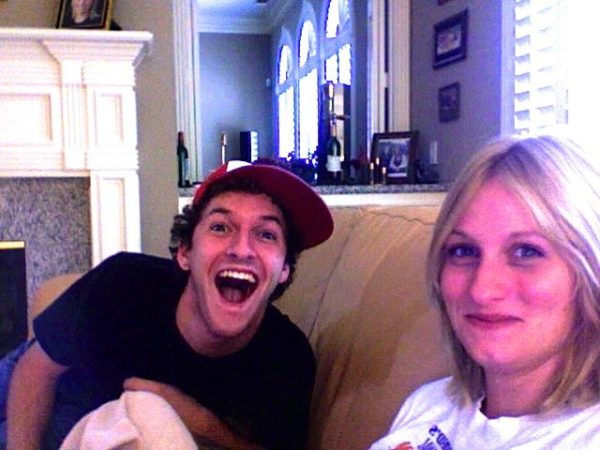Enjoy the first of this five-part interview series! If anyone is looking for a female roommate for the Channeling Erik event in San Diego, email me at emedhus@gmail.com.
Me: Hi Jamie!
Jamie: Hi.
Me: Did Erik bring in Gandhi for us?
Jamie: Oh Yeah.
Me: Good!
Jamie: It was a 5:11 AM wake up call.
Me: Oh, my apologies. Erik!
Jamie giggles.
Jamie: And I could not fall asleep. I really didn’t know why. I had kind of forgotten that this was happening today, because I think we had made arrangements a few days ago, and I was lying in bed and Erik was telling me to get up so I could center myself. He wanted me to only drink liquids today before having this, so I’ve been drinking tons of water, and I’m going to have a big lunch after this, I can tell you that! So, I had time to meditate this morning and call him in. It was a nice, different vibe than we’ve done with the other connections. We’re just kind of “here we are” whereas Gandhi kind of had this whole “come in; let’s do this together,” and here he is. It set a mood.
Me: Okay. All right. Hello, Gandhi! How are you doing?
Gandhi: Hello. I’m doing fine.
Me: Good. All right. Can we ask you some questions, please?
Gandhi: Please do.
Me: Good.
Jamie: He’s got good crisp dictation. (She means diction, of course.)
Me: I would like the first question to be this: It is told that the Indian literary classics had a deep impact on your life, particularly the one about King Harish Chandra. I’m sorry if I’m not pronouncing that right. Can you tell me how and why?
Gandhi: The pronunciation doesn’t matter. Literary influence should be important to everyone. It is a chance to see through another person’s eyes. It is a chance to experience another person’s knowledge, how they interact with the world, and how you are going to allow it to influence yourself. This encouraged me to not focus on the exterior of the body but the importance of the interior side. As I was a younger man, I often studied more on perfection, material look, the fabric of my suit, how my tongue moved in my mouth, what kind of knowledge I was going to gather in that one day, and as I became an educated man, I began to change the focus not on what I could see, but what I could feel. This shift for me was a pivot in m life. I didn’t need encouragement. I didn’t need discipline to follow it, because my heart was so happy, and all of my fears were gone. Every step I took after this, after these influences that you’re speaking of were for the betterment of the world, for the betterment of the man inside my body, and it was to encourage people to be educated, not just be born warriors.
Jamie: He has both of his hands on the chair, and every now and then one had would come up, but it’s a very slow gesture. There’s nothing bubbly or outrageous. He’s real centered in his words. He has no difficulty in pausing and thinking before he speaks. It’s such a different feel. Nothing is rushed. All the time is going to be available. He was talking about the warrior.
Gandhi: Of course every emotion has its place in life. It’s just where do you choose to place it?
Me: Now you were married at the age of 13 to 14 years old. You had a child at the age of 15, but the child died only a few days later. Did that part of your childhood affect your political future at all?
Jamie (smiling): When you started saying the ages of when he was married, he kind of smiles and he says, “Was I that young?” It just wasn’t a marker for him to look at the age of when he married. The death of his firstborn, he’s sharing with me that it was very impactful on him. It was his first lesson in grief. But being at such a young age, it was by his father and by the environment that he was raised in. So, when he experienced the loss of his son, it was through that set of eyes. He quickly—there was quickly another child after, and then soon he left.
(Pause)
Jamie (to Gandhi): What do you mean you left?
Jamie: He went away to school. To London, to school. And this distance he had with his wife and his newborn was equivalent to the distance of the son who had passed away. And he was able to work through those changes but often relied on that experience to help other people that he came across in life and how to see that the loss and the suffering does not have to be sadness. It can be experienced in a grateful and in a very beautiful and delicate way.
Me: Hm.
Jamie (smiling): I love the way he says “beautiful.”
Me: Aw! Okay. Now, were you a good father and husband? It’s said that you were not.
Jamie: Yeah, when you asked, he furried his brow—
Me: Furrowed? Yeah, okay.
Jamie: Kind of dropped his chin, but his shoulders are still, he’s still relaxed.
Gandhi: If you’re looking at my actions measured against the description of what a father is today, I was not that man. I was more comfortable and more driven to have the experience of helping the country, a nation, the world and having my children see this in their father.
Jamie: He says his wife was an angel sent to him.
Me: Aw!
Jamie: She accepted his calling in life.
Gandhi: She never once put her foot in front of me. She chose to stand beside me, and it was through many deep conversations that we held a true and honest love. This is the medicine that all people need in life.
Me: Your attempts to establish a law practice failed because you were too shy to speak up. Why was this?
Gandhi: What I was speaking up with didn’t resonate with what my inner body wanted to do. It couldn’t come out. It couldn’t come out. It was not important. And the moment I saw and experienced—
Jamie (to Gandhi): Discrimination? Are you saying discrimination?
Gandhi: –discrimination among people. It lit a fire in me that never went out, and the fire in me was energy. It was power; it was warmth; it was not about destruction. And though there were many literatures or many lectures and lessons from religions and beliefs before, there was nothing that could fulfill what I needed to teach. I decided to submerge myself in this situation to understand how to give it a language. And when I found that language, I dedicated to teaching it to anyone and everyone who was willing to listen.
Me: Okay. Did you have any idols that influenced you greatly?
Gandhi: No.
Me: In South Africa, you experienced racism, prejudice and social injustice firsthand, being thrown off a train, being beaten for not making room for European passengers, by being barred from several hotels. Was this the turning point for you? If so, tell us more.
Jamie: I looked at him and said, “All of this happened to you?” and when I asked him he kind of shot off that this was not something to be proud of or to wear as an honor or a badge.
Gandhi: All of these things were inflicted upon me by people who did not know how to express their inner love-truth.
Jamie: Love-truth.
Gandhi: Because I received these experiences willingly—
(Pause)
Jamie: I just looked at him and said, “Really?” He’s putting his hand out to me. He’s got these very large knuckles, you know.
We both giggle.
Gandhi: Because I received these discriminations, these beatings, these words—
Jamie: He’s also talking about jail time. Willingly he accepted what was pushed upon him as being passful? Paciful? Is that a word?
Me: Peaceful?
Jamie giggles nervously.
Gandhi: Do not be nervous.
Jamie (giggling): Okay.
(Pause as Jamie takes in a deep breath.)
Jamie (to Gandhi): Continue.
Jamie: Because he accepted it willingly, the offender, the one lashing out, was able to see his actions were not receiving the kind of reaction they needed to feel empowered for what they were doing, and this is what created the change.
Gandhi: So, if you are asking me if this was the point when I decided to become a different man, it was. In fact, it was the moment that I was ripped from the train—
Jamie: He kind of pulls his hand out like he was grabbed and forcefully taken off.
Gandhi: I chose not to go anywhere but to sit and observe in the train station how other Indian people were treated by the British. This is when I decided that I would no longer pursue law, even though I was hired to go to South America to follow my law career—
Me: South America or South Africa?
Jamie (giggling): South Africa. Sorry! South Africa. It’s funny. It’s the picture I had in my head. I had no idea I was saying “America.” So, he was most happy that this cause came along that he didn’t have to follow law.



